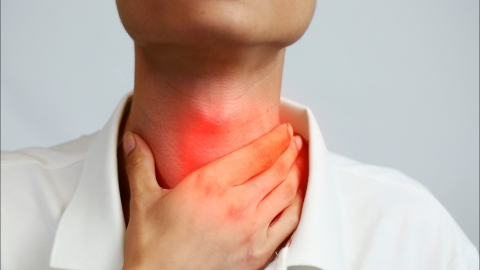Why does my throat hurt after a gastroscopy?
Generally, sore throat after gastroscopy may be caused by factors such as pharyngeal muscle tension, throat irritation, reflux esophagitis, acute tonsillitis, or chronic pharyngitis. Symptomatic management through general care and medication may be needed. If discomfort persists, it is recommended to seek timely medical advice for appropriate treatment. Detailed explanations are as follows:

1. Pharyngeal Muscle Tension
During gastroscopy, patients may unconsciously contract their throat muscles due to anxiety or discomfort, leading to throat pain after the procedure. Symptoms may also include hoarseness or difficulty swallowing. It is recommended to practice deep breathing or undergo relaxation training to help relieve the tension in throat muscles.
2. Throat Irritation
During the gastroscopy, the endoscope passes through the throat into the esophagus, which may physically irritate the mucous membrane of the throat, causing local inflammatory reactions and pain. Patients may experience dryness, discomfort during swallowing, or mild coughing. It is recommended to drink an appropriate amount of water after the procedure and avoid spicy or irritating foods to help alleviate throat discomfort.
3. Reflux Esophagitis
Pressure changes between the stomach and esophagus may occur during gastroscopy, making it easier for stomach contents to reflux into the esophagus. This may lead to reflux esophagitis, which can cause throat pain due to inflammation. Symptoms such as acid regurgitation and a burning sensation behind the breastbone may also be present. It is recommended to follow medical advice to use medications such as Cisapride tablets, Esomeprazole Magnesium Enteric-coated tablets, or Rabeprazole Sodium Enteric-coated tablets to alleviate symptoms.
4. Acute Tonsillitis
Acute tonsillitis is caused by viral or bacterial infection, which may lead to difficulty swallowing and throat pain. During gastroscopy, irritation caused by the scope in the throat area may trigger or worsen symptoms of acute tonsillitis. Symptoms such as fever, chills, and headache may also occur. It is recommended to follow medical advice to use medications such as Cefadroxil Dry Mix, Procaine Penicillin for Injection, or Clindamycin Hydrochloride tablets to alleviate symptoms.
5. Chronic Pharyngitis
Chronic pharyngitis is a chronic inflammation of the pharyngeal mucosa, mainly caused by bacterial infection, viral infection, or unhealthy lifestyle habits. If a patient already has this condition, the gastroscopy may exacerbate the inflammation, resulting in throat pain, accompanied by symptoms such as dryness, itching in the throat, or irritation-induced coughing. It is recommended to undergo treatment under a doctor's guidance using medications such as Compound Lonicera Japonica Granules, Amoxicillin Capsules, or Roxithromycin tablets.
It is recommended that patients consume cool or warm, soft foods such as millet porridge or soft noodles after gastroscopy, and avoid spicy, hot, or coarse foods to prevent worsening of throat pain.





